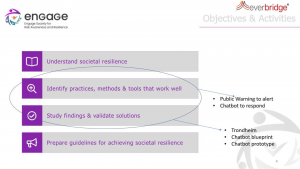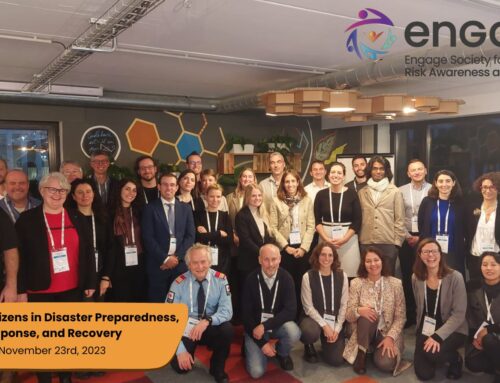Project ENGAGE presented its recent advances in research on societal resilience at the Public Safety Communication Europe Annual Meeting in Salzburg, on May 11 and 12th, 2022. As one of the partners of the consortium of sixteen, Everbridge division One2many coded and realized a prototype of a public warning chatbot, based on the blueprint study of the Disaster Management Department developed by the University of Tel Aviv, another partner.
Everbridge contributes to ENGAGE with its expertise in technology solutions applied to the general public. Its Public Warning Center (PWC) applied to an initial phase of an emergency/disaster – when citizens need to be warned and informed. It offers two mobile technologies implemented in 21 countries worldwide, of which 10 are EU or EEA countries. Such a list includes Norway, where a real-life simulation exercise will occur in 2023.

This work was a synergy between the academic and practitioner expertise enabled by the EU Horizon 2020 research grant projects and led to the concretization of a blueprint study into a technology-ready prototype. The blueprint is a thorough piece of comparative research of 45 chatbot types and functionalities applied in a variety of cultural and societal settings. The prototype is a machine-learning module, based on the blueprint specifications, and interoperating within a public warning environment to reduce the congestion or the overload of emergency response centres when an emergency happens. Among the aspects highlighted by the blueprint, which the chatbot prototype will seek to validate, are:
- Chatbots are not yet USED extensively for Societal Resilience because of issues of TRUST
- The vast majority provides content on closed-domain
- Limited chatbot coverage on active crises
- A chatbot can alleviate the potential overload of call centres
- They can provide the community with tailored and contextual information
- They can minimize abuse against responders
According to the EU Directive of 2018, the European Electronic Communication Code, all EU member states must implement a public warning system (”Reverse 112”) reaching all citizens based on their location and without prior registration (art. 110). Through the use of machine learning and artificial intelligence, Project-Engage is advancing research on the interaction of emergency responders with the civilian population. ENGAGE will simulate a live public warning exercise which can engage close to 100% of citizens in the area being tested, with additional table-top exercises with first responders and volunteers, which will complement the methodological research.
When an emergency happens, and the 112 number or other emergency response centre cannot respond to queries due to the surge in call volume, the prototype chatbot link clearly communicated in the public alert message will allow the population to access relevant safety information otherwise unavailable. Standard questions such as “what happens?”, “which direction to evacuate?”, “How distant is the accident?” among numerous others, are elaborated through advanced machine learning and natural language generation (NLG). This prototype is expected to be tested in the municipality of Trondheim in 2023, on the occasion of a landslide drill simulation, organized by Project-ENGAGE in cooperation with the Trondheim Red Cross, the Trondheim municipality, and Everbridge Norway division.
On the occasion of the PSCE annual meeting in Salzburg, Austria, we showcased to a community of practitioners from multiple European countries how this piece of applied research seeks to ENGAGE the whole society and advance societal resilience in responding to crises effectively. The drill will be an exercise contributing to validating the project solutions included in the Project-ENGAGE Knowledge Platform.
Early warning systems exist to protect territories and their communities in the event of severe disruptions such as those created by extreme weather or a multiplicity of other disasters. Unfortunately, vital notifications are often not sent, sent too late, or received too late to respond effectively. Limited capacity to orchestrate responders’ operations, such as rescue interventions, with appropriate protection and security measures, poses a risk and undermines societal resilience. This is the risk that Everbridge mission wishes to reduce by Keeping people safe, and businesses running.
Author: Rachele Gianfranchi, Head of Government Affairs at Everbridge





